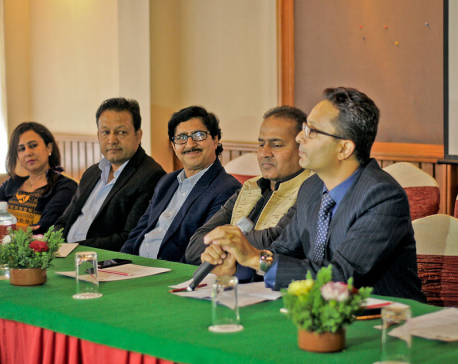
OR
Opinion
The Media and Fight Against Corruption in Nepal
Published On: February 10, 2023 09:30 AM NPT By: Rajendra Prasad Koirala

According to a report released by Transparency International Nepal on January 28, 2020, corruption has risen rapidly since the implementation of federalism in Nepal.
Over the past five years, the nation has undergone a period of ‘unionism’, during which time the public sector has stagnated. The country's economy has suffered as a result of power struggles, animosity, abuse, and corruption. Currently, the nation is in the process of implementing a federal system of governance, which consists of local, provincial, and federal levels. The government is now run by elected representatives and has engaged with the citizens. Although there have been some positive developments and construction projects are underway, there is still widespread corruption at all levels of the state, and ongoing conflicts and distortions remain a challenge. In short, corruption continues to be a pervasive issue.
It is imperative to dismantle the corrupt institutional network that permeates all industries, regardless of whether they are public or private, government or non-government. The traditional secret deals that once took place behind closed doors have been replaced by more overt transactions in public spaces such as cafes, restaurants, and bars. The allocation of a portion of each development project for "personnel management" has become a widespread, unspoken policy. Unfortunately, instead of facing consequences for their actions, the corrupt are often rewarded, further fueling their audacity.
Good governance is essential, yet unfortunately, bad governance also exists. Corruption is prevalent in areas where governance is weak. Despite repeated promises from the administration during elections to improve governance, the reality is that the people have been disappointed for the past 45 years. The corruption has spread throughout the government, from the federal level to local authorities. It has been reported that members of the ruling political party are engaging in unethical practices such as favoring their relatives in infrastructure development projects, accepting bribes in the form of commissions, compromising on the quality of construction materials and workmanship, inflating project costs, and accepting variation orders without proper inspection. There is limited competition in contract bidding, and public resources are often misused for personal gain. The practices of delaying institutional interests, leaking confidential information, and making public decisions based on personal interests are also prevalent.
It has been found that political influence plays a role in the majority of instances of corruption. When powerful individuals and organizations become implicated in corrupt practices, corruption becomes more institutionalized. Our societal system promotes corruption by valuing wealth and recognizing individuals who have gained it through unethical means. These individuals are often referred to as "successful members of society," despite having benefited from corruption. If the corrupt cockroaches since 1990 are apprehended by a strong legal system and their assets are seized, it could finance the country's budget for 10 years. However, the efficiency of the judicial system must be addressed, as it currently has a backlog of 27,000 cases due to inadequate staffing and delayed judge appointments. The egos of Cholendra Shamsher and Shambhu Thapa & Co. have contributed to the chaos in the courtroom. According to the report released by Transparency International Nepal on January 28, 2020, corruption has risen rapidly since the implementation of federalism in Nepal. In the 180-nation survey conducted by Transparency's (Corruption Perception Index), Nepal ranked 117th among countries with the highest levels of corruption.
The election process in the nation is marred by concerns of fairness and impartiality. The financing of political parties is opaque, with no clear disclosure of funds received and utilized. Individuals with a history of corruption are provided with political favors, perpetuating the cycle of corruption. The implementation of anti-corruption laws and proper functioning of anti-corruption agencies is lacking, leading to a disregard for the existing laws and regulations. The prevalence of bribery, commissions, and collusion in the civil service has created a culture of corruption that continues to spread. This lack of accountability and transparency, combined with a shift in the perception of public servants as masters rather than servants, has contributed to a moral decline and an increase in corruption. The corruption network within the bureaucracy is so deeply rooted that it poses a threat to the nation and entangles even the ministers.
The media is crucial in the battle against corruption because it can demand accountability and openness from both the public and private sectors. The link between press freedom and corruption has been demonstrated in numerous research.
Since government operations are by purpose or by default opaque, the media reports on corruption in the public sector. We have learned about these crimes thus far, thanks to the media, particularly investigative journalism, which plays a crucial role in exposing and combating impunity as well as examining corruption.
In its 2018 report on the function of the media and investigative journalism, the Organization for Economic Cooperation and Development (OECD) underlined how public awareness of fraud and corruption in international aid programs had increased.
Providing the public with accurate news is the media's most precious asset. The media has advanced quickly in the 21st century. The world has entered the era of the Internet. Today, there is a large ocean of knowledge, but we must be careful because the wrong information might drown us. The information we read, watch, and hear in the media has to be verified. Because it is so crucial to our personal lives and many other aspects of our lives, the media is a blessing for people.
The media is also called the fourth organ of the state. The primary objective of this fourth organ is to uphold sound government. The fourth organ of the state hears appeals when the executive, legislative, and judicial branches of government are unable to provide justice for the people. The government makes admirable efforts to guarantee everyone's security and eradicate corruption, but these efforts have yielded little results. Investigative journalism has been used to fill this gap.
The media plays a crucial role in combating both direct and indirect forms of corruption. It can raise awareness among the general public about government corruption and hold those in power accountable. This can be achieved through investigative reporting and exposing dishonest officials and politicians, leading to their resignation. However, there have been instances where media company owners have suppressed such reporting due to influence from powerful individuals, families, brokers, and the mafia. The media industry also faces threats from individuals who claim to be journalists but actually engage in political brokering and haggling, misusing their press credentials. In today's world, even members of political parties at various levels, including judges and constitutional bodies, have connections with the media. There are even rumors that the police chief has a press pass! In essence, one cannot be considered a journalist if they do not perform the core duties of reporting news, writing articles, conducting interviews, hosting radio or television programs, and telling stories. However, the problem of marketing staff members carrying press passes from the information desk still persists.
Social media and other forms of media have often played a crucial role in exposing major frauds. The principles of democracy and a free press are intertwined, as they both strive towards a common goal of transparency and accountability. Just as the flesh and nails are intricately linked in the human body, without a free press, democracy remains incomplete and is reduced to just a formality.
The battle against corruption, which has pervaded both political and economic realms like a virus, cannot be won by a single person or group of individuals. Merely celebrating Mercury Day will not make a difference in this effort. Despite strong declarations of commitment to good governance, corruption continues to persist. Empty promises and lip service will not be enough to eliminate it. The solution lies in the collective efforts of all participants in the political and economic spheres to act with integrity and morality. A combination of strong organizational structures, the enforcement of laws, and a cultural emphasis on ethics and values is essential in the fight against corruption. It is important that philosophy, technology, and organization all work together in harmony, with actions matching words.
Unfortunately, even in this era of heightened awareness, there are still those who are blind to the devastating effects of exploiting their own country. It is unfortunate that they continue to vote for corrupt leaders and entrust them with shaping their own destiny and that of future generations. This toxic cycle of corruption perpetuates a state of disarray, regression and hopelessness, leaving the nation's future uncertain and bleak. Tragically, this corrupt culture continues to attract future generations, causing them to fall into its trap.
"Democracy is not only a form of government, but also a way of life for citizens," said Member of Parliament Sovita Gautam recently in parliament. The media plays a vital role in highlighting and reflecting the ways in which people's lives can be improved and corruption can be eradicated.
(The author is a PhD scholar and the CEO of Gyanda Academy.)
You May Like This

Nepal Media Society to run campaign against corruption
KATHMANDU, September 6: The umbrella organization of the Nepali print and electronic media, Nepal Media Society has decided to start... Read More...

Why corruption endures
Failure to secure justice through the transitional peace process provides the moral justification that sustains corruption in Nepal ... Read More...

One arrested for collecting 15m alluring youth of good foreign jobs
KATHMANDU, Jan 10: The Metropolitan Crime Division of Nepal Police has arrested a person for allegedly amassing a huge amount... Read More...











Just In
- Challenges Confronting the New Coalition
- NRB introduces cautiously flexible measures to address ongoing slowdown in various economic sectors
- Forced Covid-19 cremations: is it too late for redemption?
- NRB to provide collateral-free loans to foreign employment seekers
- NEB to publish Grade 12 results next week
- Body handover begins; Relatives remain dissatisfied with insurance, compensation amount
- NC defers its plan to join Koshi govt
- NRB to review microfinance loan interest rate








Leave A Comment